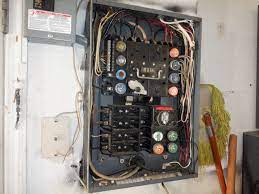
Should a Circuit Breaker Be Installed Instead of a Fuse Box?
Do you have an ancient fuse box in your home? Are you thinking about upgrading from a fuse box to a circuit breaker? Fuse boxes are permitted in many places despite the fact that they can be dangerous and cause major electrical problems. Metal fuses have the potential to catch fire if they become overheated. Circuit breakers, on the other hand, are made of plastic and trip when overloaded, preventing a fire from starting. The best course of action is to contact an electrician in Salt Lake City, such as Orange Electric.
Fuse boxes are used to control electrical flow in homes built decades ago. Given current electrical developments, fuse boxes are considered obsolete by electricians. As a result, the majority of them recommend using a circuit breaker instead of a fuse box. But why?
High-Voltage Can Be Accommodated
A circuit breaker is a type of electrical switch that protects an electrical circuit against overload or short circuit damage. When a defect is discovered, the primary goal is to stop the flow of current. In contrast to a fuse box, which is only used once and must be replaced, a circuit breaker can be reset to continue working. Circuit breakers come in all shapes and sizes, from tiny devices that protect individual appliances or low-current circuits to massive switchgear that protects high-voltage circuits that power an entire city.
The majority of circuits in a typical home circuit breaker panel, including the main panel feed breaker, will employ 1/2″ wide “mini” or “type CH” breakers, while heavy-draw circuits such as clothes dryers and oven ranges will use full size 1″ wide “type C” breakers. One or more “master” breakers will also be installed, each with a rating equal to the entire power capacity of the service feeding the main panel.
Certain Conditions Prevent Fuse Operations
Fuse boxes and ground fault circuit interrupters (GFCIs) are two types of electrical equipment. Fuse boxes protect circuits from overload by cutting the circuit off when it receives too much current. GFCIs, on the other hand, are designed to cut off the flow of electricity when a ground fault is detected in order to prevent shocks.
GFCIs and fuse boxes cannot be used simultaneously because they provide separate functions. If a GFCI is installed in a circuit that is fuse box protected, it will trip if a fuse blows, rendering the fuse box ineffective. If a GFCI is installed on a circuit with a faulty fuse box, it will not provide any protection. Because of these considerations, fuse boxes and GFCIs cannot be used in the same electrical system.
Do You Need Replacement or Repair?
It is impossible to know whether you should repair or replace your electrical panel without having it assessed by an expert. Although electrical panels can be repaired, many common problems that homeowners have with their electrical panels necessitate a replacement rather than a repair. For example, a fuse box must be replaced.
An electrician must assess the condition of an electrical panel before it can be repaired. A professional can usually repair wiring problems without replacing your electrical panel. Orange Electric’s professional electricians can help you if your electrical panel needs to be improved or repaired.
